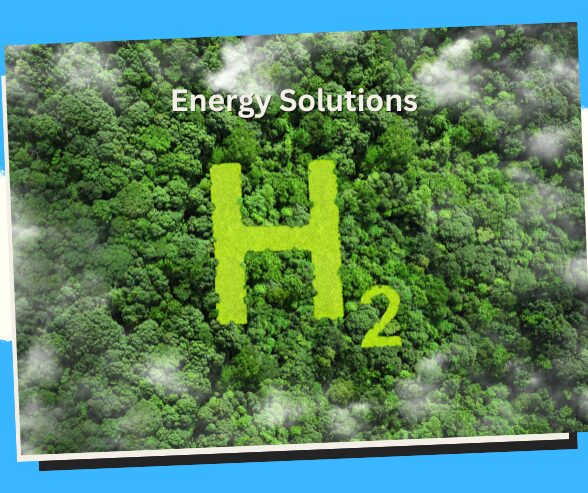
Mastering the Energy Revolution: Keeping Up with Hydrogen Fuel Cells Evolution
Explore the forefront of energy innovation with our guide to the latest developments in hydrogen fuel cells, offering a glimpse into the future of clean and efficient power.
Unlocking the Power of Tomorrow: Understanding the Latest in Hydrogen Fuel Cells
In the quest for clean and sustainable energy solutions, hydrogen fuel cells have emerged as a promising technology with the potential to revolutionize various industries. In this comprehensive guide, we’ll delve into the latest advancements in hydrogen fuel cell technology, exploring how it works, its applications, and the implications for a greener future. Let’s embark on a journey to unlock the power of hydrogen together! 💧⚡
What are Hydrogen Fuel Cells?
Hydrogen fuel cells are electrochemical devices that convert the chemical energy of hydrogen and oxygen into electricity, with water as the only byproduct. Unlike traditional combustion engines that produce harmful emissions, fuel cells offer a clean and efficient alternative for generating power.
How Do Hydrogen Fuel Cells Work?
At the heart of a hydrogen fuel cell is a membrane electrode assembly (MEA) sandwiched between an anode and a cathode. Hydrogen gas is supplied to the anode, where it undergoes a chemical reaction that splits it into protons and electrons. The protons migrate through the membrane to the cathode, while the electrons travel through an external circuit, generating electrical current. At the cathode, the protons, electrons, and oxygen from the air combine to produce water as the only exhaust.
Advancements in Hydrogen Fuel Cell Technology
Recent advancements in hydrogen fuel cell technology have focused on improving efficiency, durability, and cost-effectiveness. Key developments include:
- Enhanced Catalysts: Novel catalyst materials have been developed to improve the kinetics of hydrogen oxidation and oxygen reduction reactions, leading to higher efficiency and performance.
- Proton Exchange Membranes (PEMs): Next-generation PEMs with improved conductivity and durability have enabled the development of more efficient and compact fuel cell systems.
- Hydrogen Storage Solutions: Innovations in hydrogen storage technologies, such as solid-state storage and metal hydrides, have addressed the challenges associated with hydrogen storage and transportation.
- Integration with Renewables: Hybrid systems that combine hydrogen fuel cells with renewable energy sources, such as solar and wind power, offer a sustainable approach to meeting energy demand.
Applications of Hydrogen Fuel Cells
Hydrogen fuel cells have a wide range of applications across various sectors, including:
- Transportation: Fuel cell vehicles (FCVs) offer zero-emission transportation solutions, with hydrogen fuel cells powering electric motors to propel vehicles.
- Stationary Power Generation: Fuel cell systems can provide clean and reliable power for residential, commercial, and industrial applications, serving as backup power sources or primary energy systems.
- Portable Electronics: Miniaturized fuel cells are being developed to power portable electronic devices, such as smartphones, laptops, and drones, offering longer runtime and faster charging.
- Marine and Aviation: Fuel cell technology holds promise for decarbonizing maritime and aviation sectors, with fuel cell-powered ships and aircraft offering sustainable alternatives to conventional propulsion systems.
Key Considerations for Hydrogen Fuel Cell Adoption
While hydrogen fuel cells offer numerous benefits, several challenges must be addressed to facilitate widespread adoption:
- Infrastructure: Establishing a robust hydrogen infrastructure, including production, storage, distribution, and refueling stations, is essential to support the deployment of fuel cell vehicles and stationary power systems.
- Cost: Despite significant advancements, hydrogen fuel cell technology remains relatively expensive compared to conventional energy sources, hindering mass-market adoption.
- Sustainability: The production of hydrogen from fossil fuels raises concerns about carbon emissions and environmental impact. Transitioning to renewable sources of hydrogen, such as electrolysis powered by solar or wind energy, is crucial for achieving sustainability goals.
- Safety: Hydrogen is highly flammable and requires careful handling and storage to ensure safety. Stringent safety regulations and standards are necessary to minimize risks associated with hydrogen fuel cell systems.
Future Outlook
The future of hydrogen fuel cells looks promising, with ongoing research and development efforts aimed at overcoming existing challenges and unlocking new opportunities. As governments, industries, and consumers increasingly prioritize sustainability and decarbonization, hydrogen fuel cells are poised to play a significant role in the transition to a cleaner and greener energy future.
Benefits of Hydrogen Fuel Cells
- Zero Emissions: Hydrogen fuel cells produce electricity through electrochemical reactions, emitting only water vapor and heat as byproducts, thus reducing greenhouse gas emissions.
- Versatility: Hydrogen fuel cells can be used in a variety of applications, including transportation, stationary power generation, and portable electronics.
- High Energy Density: Hydrogen has a high energy density by weight, making it an efficient energy carrier for applications requiring long-range or extended operation.
- Rapid Refueling: Refueling hydrogen-powered vehicles is comparable in speed to refueling conventional vehicles, providing a familiar experience for consumers.
- Reduced Dependence on Fossil Fuels: By utilizing hydrogen as a fuel source, we can reduce our dependence on finite fossil fuel reserves, enhancing energy security.
- Quiet Operation: Hydrogen fuel cells operate silently, making them ideal for applications where noise pollution is a concern, such as residential areas or indoor environments.
- Scalability: Hydrogen fuel cell systems can be scaled up or down to meet the energy needs of various applications, from small electronic devices to large industrial facilities.
- Compatibility with Renewable Energy: Hydrogen can be produced from renewable sources such as wind or solar power, offering a pathway to decarbonization and grid integration.
- Longevity: Hydrogen fuel cells have demonstrated long lifespans, with some systems surpassing 10,000 hours of continuous operation, making them a reliable and durable energy solution.
- Potential for Grid Balancing: Hydrogen fuel cells can play a role in grid balancing and energy storage, helping to stabilize intermittent renewable energy sources like wind and solar.
Case Studies: Real-World Applications of Hydrogen Fuel Cells
- Hydrogen-Powered Vehicles: Automotive companies like Toyota and Hyundai have introduced hydrogen fuel cell vehicles (FCVs) such as the Toyota Mirai and Hyundai Nexo, demonstrating the viability of hydrogen as a clean transportation fuel.
- Maritime Applications: The shipping industry is exploring hydrogen fuel cells as a sustainable alternative to traditional marine propulsion systems, with pilot projects like the Energy Observer showcasing hydrogen-powered vessels.
- Backup Power Systems: Telecom companies like AT&T and Verizon are deploying hydrogen fuel cell backup power systems to ensure uninterrupted communication services during grid outages, improving resilience and reliability.
- Distributed Energy Generation: Remote communities and off-grid facilities are utilizing hydrogen fuel cells for distributed energy generation, providing reliable power in areas with limited access to traditional grid infrastructure.
- Public Transit: Cities around the world, including London and Tokyo, are integrating hydrogen fuel cell buses into their public transit fleets, offering zero-emission transportation options for urban commuters.
- Industrial Applications: Industries such as manufacturing and logistics are adopting hydrogen fuel cells for forklifts, material handling equipment, and other industrial machinery, reducing emissions and improving operational efficiency.
- Aerospace Innovation: Aerospace companies like Airbus and Boeing are exploring hydrogen fuel cells for aircraft propulsion, aiming to reduce aviation’s carbon footprint and address concerns about emissions.
- Stationary Power Generation: Data centers, hospitals, and commercial buildings are installing hydrogen fuel cell systems for stationary power generation, providing reliable backup power and reducing grid dependence.
- Microgrid Integration: Hydrogen fuel cells are being integrated into microgrid systems to provide clean and resilient power solutions for remote communities, military installations, and disaster relief efforts.
- Hydrogen Infrastructure Development: Countries like Japan and Germany are investing in hydrogen infrastructure, including production, storage, and distribution facilities, to support the widespread adoption of hydrogen fuel cell technology.
Key Takeaways for Understanding Hydrogen Fuel Cells
- Efficiency Matters: Hydrogen fuel cells offer high efficiency in converting fuel to electricity, making them a compelling option for clean energy generation.
- Infrastructure Challenges: The widespread adoption of hydrogen fuel cells faces challenges related to infrastructure development, including hydrogen production, storage, and distribution.
- Collaboration is Key: Public-private partnerships and international collaboration are essential for advancing hydrogen fuel cell technology and overcoming barriers to adoption.
- Safety Considerations: Hydrogen is a highly flammable gas, requiring careful handling and adherence to safety protocols in production, storage, and use.
- Cost Reduction Strategies: Continued research and innovation are needed to reduce the cost of hydrogen production and fuel cell systems, making them more competitive with traditional energy sources.
- Policy Support: Supportive policies, including incentives, subsidies, and regulatory frameworks, are crucial for incentivizing investment in hydrogen fuel cell technology and infrastructure.
- Consumer Awareness: Educating consumers about the benefits and potential applications of hydrogen fuel cells is essential for driving demand and market acceptance.
- Lifecycle Analysis: Assessing the environmental impact of hydrogen fuel cells requires a comprehensive lifecycle analysis, considering factors such as production methods and fuel sourcing.
- Hydrogen Production Methods: Various methods, including electrolysis, steam methane reforming, and biomass gasification, are used to produce hydrogen, each with its advantages and challenges.
- Global Momentum: Momentum is building hydrogen fuel cell technology on a global scale, with governments, industries, and research institutions investing in research, development, and deployment.
FAQ: Addressing Common Questions About Hydrogen Fuel Cells
- Q: How does a hydrogen fuel cell work?
A: Hydrogen fuel cells generate electricity through an electrochemical reaction between hydrogen and oxygen, producing water vapor as the only byproduct. - Q: Where does hydrogen come from?
A: Hydrogen can be produced from various sources, including natural gas, electrolysis of water using renewable electricity, and biomass gasification. - Q: Is hydrogen safe to use as a fuel?
A: Hydrogen is flammable and requires proper handling, storage, and safety measures, but when used according to established protocols, it can be safely utilized. - Q: How efficient are hydrogen fuel cells compared to batteries?
A: Hydrogen fuel cells offer higher energy density and longer operating ranges compared to batteries, making them suitable for applications requiring extended operation or rapid refueling. - Q: Can I convert my existing vehicle to run on hydrogen?
A: Retrofitting existing vehicles for hydrogen fuel cell operation is possible but may require significant modifications and investments in infrastructure. - Q: Are hydrogen fuel cells cost-effective compared to traditional energy sources?
A: The cost-effectiveness of hydrogen fuel cells depends on various factors such as production methods, infrastructure costs, and energy market dynamics. While costs are decreasing with technological advancements and scale, hydrogen fuel cells may still face cost competitiveness challenges in certain applications compared to traditional energy sources. - Q: What are the environmental benefits of hydrogen fuel cells?
A: Hydrogen fuel cells offer environmental benefits such as zero greenhouse gas emissions during operation and the potential for using renewable energy sources for hydrogen production, contributing to decarbonization efforts. - Q: Can hydrogen fuel cells replace fossil fuels entirely?
A: While hydrogen fuel cells hold promise as a clean energy solution, their widespread adoption and full replacement of fossil fuels would require significant infrastructure development, technological advancements, and supportive policies. - Q: What are the limitations of hydrogen fuel cells?
A: Limitations of hydrogen fuel cells include infrastructure challenges, such as hydrogen production, storage, and distribution, as well as cost competitiveness compared to conventional energy sources in some applications. - Q: How is hydrogen transportation evolving?
A: Hydrogen transportation is evolving with the development of hydrogen fuel cell vehicles (FCVs) and advancements in hydrogen refueling infrastructure. FCVs offer zero-emission transportation solutions, with companies investing in expanding hydrogen refueling networks to support their adoption.
Conclusion: Navigating the Hydrogen Frontier 🌐
As we stand at the cusp of a renewable energy revolution, hydrogen fuel cells emerge as a beacon of hope in our quest for a sustainable future. By unlocking the potential of hydrogen as a clean, efficient, and versatile energy carrier, we pave the way toward a world powered by renewable resources.
While challenges lie ahead, from infrastructure development to cost competitiveness, the momentum behind hydrogen fuel cell technology continues to grow, driven by innovation, collaboration, and a shared commitment to environmental stewardship.
Hydrogen fuel cells represent a groundbreaking technology with the potential to transform the way we generate and consume energy. By harnessing the power of hydrogen, we can reduce greenhouse gas emissions, mitigate climate change, and create a more sustainable world for future generations. As we continue to innovate and advance hydrogen fuel cell technology, let’s embrace the promise of clean energy and pave the way for a brighter tomorrow. 💧⚡
Key Phrases
- Hydrogen fuel cells
- Renewable energy
- Clean technology
- Sustainable energy
- Fuel cell innovations
- Green technology
- Energy revolution
- Hydrogen technology
- Environmental impact
- Alternative energy
Hashtags
- #HydrogenFuelCells
- #RenewableEnergy
- #CleanTechnology
- #SustainableEnergy
- #FuelCellInnovations
- #GreenTechnology
- #EnergyRevolution
- #HydrogenTechnology
- #EnvironmentalImpact
- #AlternativeEnergy
Save/Share this story with QR CODE
Disclaimer
This article is for informational purposes only and does not constitute endorsement of any specific technologies or methodologies and financial advice or endorsement of any specific products or services.
📩 Need to get in touch?
📩 Feel free to Contact NextGenDay.com for comments, suggestions, reviews, or anything else.
We appreciate your reading. 😊Simple Ways To Say Thanks & Support Us:
1.) ❤️GIVE A TIP. Send a small donation thru Paypal😊❤️
Your DONATION will be used to fund and maintain NEXTGENDAY.com
Subscribers in the Philippines can make donations to mobile number 0917 906 3081, thru GCash.
3.) 🛒 BUY or SIGN UP to our AFFILIATE PARTNERS.
4.) 👍 Give this news article a THUMBS UP, and Leave a Comment (at Least Five Words).
AFFILIATE PARTNERS

World Class Nutritional Supplements - Buy Highest Quality Products, Purest Most Healthy Ingredients, Direct to your Door! Up to 90% OFF.
Join LiveGood Today - A company created to satisfy the world's most demanding leaders and entrepreneurs, with the best compensation plan today.



 Business Technology, Finance Technology & Information Technology
Business Technology, Finance Technology & Information Technology




